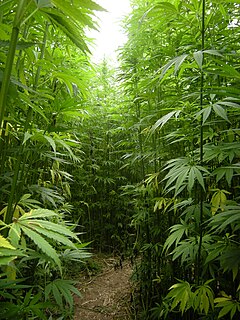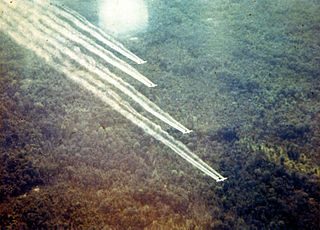Related Research Articles

The prohibition of drugs through sumptuary legislation or religious law is a common means of attempting to prevent the recreational use of certain intoxicating substances.

Coca eradication is a strategy promoted by the United States government starting in 1961 as part of its "War on Drugs" to eliminate the cultivation of coca, a plant whose leaves are not only traditionally used by indigenous cultures but also, in modern society, in the manufacture of cocaine. The strategy was adopted in place of running educational campaigns against drug usage. The prohibitionist strategy is being pursued in the coca-growing regions of Colombia, Peru, and formerly Bolivia, where it is highly controversial because of its environmental, health and socioeconomic impact. Furthermore, indigenous cultures living in the Altiplano, such as the Aymaras, use the coca leaf in many of their cultural traditions, notably for its medicinal qualities in alleviating the feeling of hunger, fatigue and headaches symptomatic of altitude sicknesses. The growers of coca are named Cocaleros and part of the coca production for traditional use is legal in Peru, Bolivia and Chile.

Plan Colombia was a United States foreign aid, military aid, and diplomatic initiative aimed at combating Colombian drug cartels and left-wing insurgent groups in Colombia. The plan was originally conceived in 1999 by the administrations of Colombian President Andrés Pastrana and U.S. President Bill Clinton, and signed into law in the United States in 2000.

Hemp, or industrial hemp, is a botanical class of Cannabis sativa cultivars grown specifically for industrial or medicinal use. It can be used to make a wide range of products. Along with bamboo, hemp is among the fastest growing plants on Earth. It was also one of the first plants to be spun into usable fiber 50,000 years ago. It can be refined into a variety of commercial items, including paper, rope, textiles, clothing, biodegradable plastics, paint, insulation, biofuel, food, and animal feed.
This article is intended to give an overview of several arguments for and against drug prohibition.

The National Institute on Drug Abuse (NIDA) is a United States federal government research institute whose mission is to "advance science on the causes and consequences of drug use and addiction and to apply that knowledge to improve individual and public health."

Herbicidal warfare is the use of substances primarily designed to destroy the plant-based ecosystem of an area. Although herbicidal warfare use chemical substances, its main purpose is to disrupt agricultural food production and/or to destroy plants which provide cover or concealment to the enemy, not to asphyxiate or poison humans and/or destroy human-made structures. Herbicidal warfare has been forbidden by the Environmental Modification Convention since 1978, which bans "any technique for changing the composition or structure of the Earth's biota".

In the United States, the non-medical use of cannabis is legalized in 19 states and decriminalized in 12 states as of May 2022. Decriminalization refers to a policy of reduced penalties for cannabis offenses, typically involving a civil penalty for possessing small amounts, instead of criminal prosecution or the threat of arrest. In jurisdictions without penalty the policy is referred to as legalization, although the term decriminalization is sometimes used for this purpose as well.

In the United States, increased restrictions and labeling of cannabis as a poison began in many states from 1906 onward, and outright prohibitions began in the 1920s. By the mid-1930s cannabis was regulated as a drug in every state, including 35 states that adopted the Uniform State Narcotic Drug Act. The first national regulation was the Marihuana Tax Act of 1937.
A drug policy is the policy regarding the control and regulation of psychoactive substances, particularly those that are addictive or cause physical and mental dependence. While drug policies are generally implemented by governments, entities at all levels may have specific policies related to drugs.

Cannabis in the United Kingdom is illegal for recreational use and is classified as a Class B drug. In 2004, cannabis was made a Class C drug with less severe penalties but it was moved back to Class B in 2009. Medical use of cannabis, when prescribed by a registered specialist doctor, was legalised in November 2018.

Cannabis in Oregon is legal for both medical and recreational use. In recent decades, the U.S. state of Oregon has had a number of legislative, legal, and cultural events surrounding use of cannabis. Oregon was the first state to decriminalize the possession of small amounts of cannabis, and among the first to authorize its use for medical purposes. An attempt to recriminalize possession of small amounts of cannabis was turned down by Oregon voters in 1997.
In 2012, coca production in Colombia amounted to 0.2% of Colombia's overall GDP and 3% of Colombia's GDP related to the agricultural sector. The great majority of coca cultivation takes place in the departments of Putumayo, Caquetá, Meta, Guaviare, Nariño, Antioquia, and Vichada.

Cannabis is a plant used in Australia for recreational, medicinal and industrial purposes. In 2019, 36% of Australians over the age of fourteen years had used cannabis in their lifetime and 11.6% had used cannabis in the last 12 months.

Coca has been cultivated in medium-altitude parts of the Bolivian Andes since at least the Inca era, primarily in the Yungas north and east of La Paz. Cultivation expanded substantially in the 1980s into the Chapare region of Cochabamba and some production flowed into the international cocaine market. The US-backed efforts to criminalize and eradicate coca as part of the War on Drugs were met by the cocalero movement's growing capacity to organize. Violence between drug police and the Bolivian armed forces on one side and the movement on the other occurred episodically between 1987 and 2003. The cocaleros became an increasingly important political force during this period, co-founding the Movement for Socialism – Political Instrument for the Sovereignty of the Peoples party. Coca growers from both the Yungas and the Chapare have advocated for policies of "social control" over coca growing, maintaining a pre-set maximum area of cultivation as an alternative to drug war policies. In 2005, cocalero union leader Evo Morales was elected president of Bolivia. Morales has pursued a combined policy of legalizing coca production in the Chapare and Yungas and eradication of the crop elsewhere.

Cannabis in South Africa has been decriminalised by the country's Constitutional Court for personal consumption by adults in private. However, laws prohibiting use outside of one's private dwelling and buying and selling cannabis still remain. Since regulations against the purchase of products containing cannabis still remain in effect, it is unclear how the ruling can be enforced.
Cannabis in Senegal is illegal; the drug is locally referred to as yamba.
The cannabis policy of the Reagan administration involved affirmation of the War on Drugs, government funded anti-cannabis media campaigns, expanded funding for law enforcement, involvement of the U.S. military in interdiction and eradication, reduction in emphasis in drug treatment, and creation of new Federal powers to test employees and seize cannabis-related assets.
During the administration of American President George H. W. Bush (1989–1993), the United States largely followed the precedents set by the cannabis policy of the Reagan administration, including prosecution of the War on Drugs.
The Tennessee Governor's Task Force on Marijuana Eradication (GTFME), a multi-agency law enforcement task force founded in 1983, is managed by the Office of the Governor of Tennessee composed of local, state agencies organized expressly to eradicate illegal cannabis cultivation and trafficking in Tennessee. The Governor's Task Force is operated by the Tennessee Bureau of Investigation's Tennessee Dangerous Drugs Task Force. The eradication season lasts from May through September in Tennessee, where outdoor marijuana cultivation ranks second in the United States, behind California. The task force, divided into three regional teams, East, Middle and West, centralized marijuana eradication in the state into a coordinated muli-agency program.
References
- 1 2 Military Review. Command and General Staff School. 1992. p. 86.
- ↑ United States. Office of National Drug Control Policy (1992). National Drug Control Strategy. Office of National Drug Control Policy, Executive Office of the President. p. 90. ISBN 9780160360534.
{{cite book}}:|author=has generic name (help) - ↑ J. R. Roberts (June 1992). National Drug Control Strategy: A Nation Responds to Drug Use. DIANE Publishing. pp. 169–. ISBN 978-0-941375-79-5.